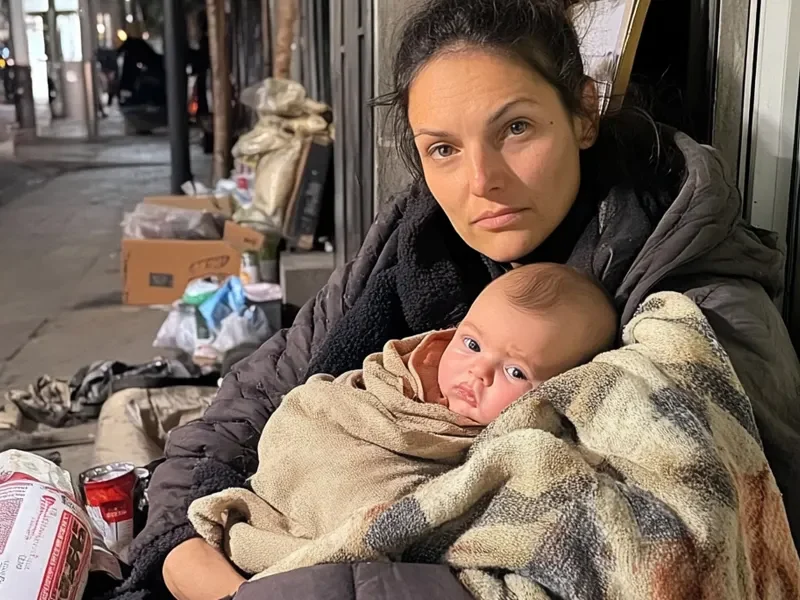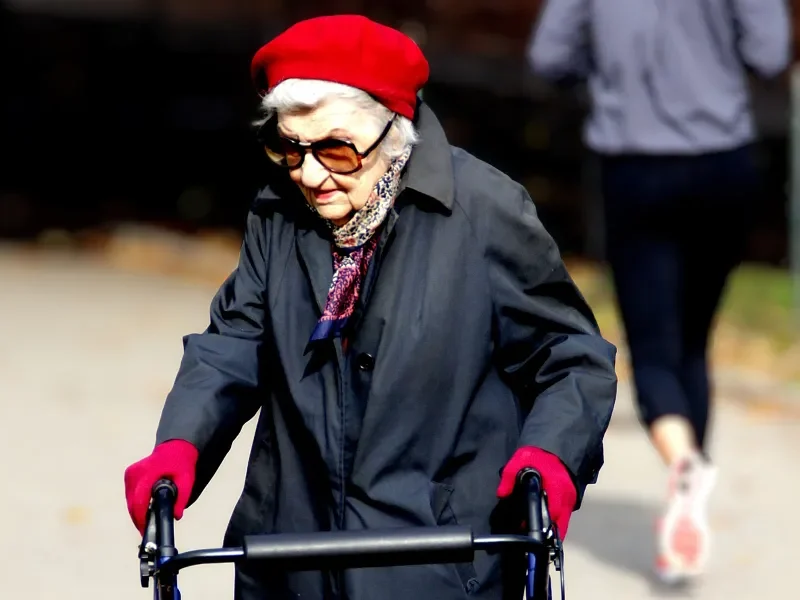I thought I’d married into the most loving family—until an unthinkable offer changed everything. What started as an act of generosity from my mother-in-law became the fight of our lives.
I married the man of my dreams because of the kind of person he was. But I was initially nervous about meeting his mother—as you know the general evil reputation mothers-in-law get. However, she shocked me by being equally kind. I thought I’d married into the perfect family until my in-law offered to be our surrogate.
When I first met Arthur, he was the kind of man who remembered everything. Not just birthdays and favorite movies, but tiny things, like how I liked two slices of lemon in my tea and that I once broke my wrist roller-skating in seventh grade.
He remembered how I liked my coffee, the name of my cat, and even the hilarious story about how my mom taught me to whistle through my teeth.
We met at a friend’s wedding at this quirky barn venue, seated across from each other at the so-called singles table, which felt more like a matchmaking experiment.
I had just spilled red wine on my green satin dress, and before I could panic, Arthur handed me his suit jacket without hesitation, with a sheepish smile, and said, “Here, now you’re fashionably clumsy.”
It was so old-fashioned and gentle, I couldn’t help but fall for him!
We got married two years later in a small lakeside ceremony, by the lake where we had our first date. Fireflies and string lights surrounded us. His mother, Linda, cried through the whole ceremony.
She gripped my hand afterward and whispered, “You’re exactly what Arthur needed.” I believed her.
Now, Linda surprised me because she wasn’t the cliché mother-in-law (MIL). She was warm, endlessly talkative, and the kind of person who showed up with chicken noodle soup when she heard a sniffle over the phone.
My MIL called me “sweetheart” and always made me sit down after dinner while she cleared the table and did the dishes. For the first five years, she treated me more like a daughter than a daughter-in-law, and I truly believed she loved me like one, too.
Arthur and I started trying for a baby not long after our wedding. We were both 34 and ready. But month after month, nothing happened. We tried everything from vitamins and acupuncture to elaborate spreadsheets tracking ovulation.
Still, no second pink line. Every test felt like a cruel joke.
After two years, we turned to in-vitro fertilization (IVF). We went through three rounds. Each one chipped away at me—emotionally, physically, and financially. The third round broke me. I sat on the bathroom floor, staring at another negative test, and cried until I could barely breathe. That’s where Linda found me.
She wrapped her arms around me and said, “Don’t lose hope, honey. Families come together in all kinds of ways.”
A week later, she knocked on our door holding a binder full of printouts and articles. She sat us down at the kitchen table and said, “I want to help you. I’ve been reading about gestational surrogacy. I’m healthy, I’ve had two babies without complications, and I’ve already talked to my doctor. He says it’s possible.”
I stared at her like she had sprouted another head!
I laughed at first, thinking she was joking.
Linda was 52, a retired elementary school teacher who spent most of her time gardening, volunteering at the library, or making jam. This couldn’t be real.
“Let me give you the family you deserve,” she insisted.
And when the doctors confirmed she was indeed in excellent health, and that it could actually work, Arthur looked at me and said quietly, “Maybe this is our answer.” He had so much hope in his eyes that I couldn’t say no.
After months of heartbreak, desperation, and fear, the idea of finally holding our child—even if it came from something as unorthodox as this—felt like the smallest sliver of hope.
We did everything right. We went through counseling, hired a lawyer, and got all the necessary medical clearances. Arthur and I even drafted a detailed contract. Linda insisted she didn’t want compensation.
She said it was a gift—one only a mother could give. Her exact words were, “I carried Arthur. I can carry this baby too.”
It felt surreal, like a miracle unfolding.
As if it were meant to be, the embryo implanted the first time. I cried when the clinic called. Linda sent us a photo of the positive test with the caption “Your little miracle is on the way!” and a dozen heart emojis.
At her first sonogram, she wore a shirt that said, “Baking for my daughter-in-law.”
For the first several months, everything was going well. Linda called me almost daily with updates. She sent us photos of her baby bump with silly captions like, “He kicked when I played Bruce Springsteen—already has good taste.”
But sometime around the seventh month, her tone changed. One day, I mentioned setting up the nursery, and she chuckled and said, “Don’t rush. He’ll be staying with me a lot, anyway.” I laughed nervously, thinking she was joking.
But then she started saying “my baby” instead of “your baby.”
I brought it up with Arthur that night, but he just dismissed me. “It’s just hormones,” he said. “You know how Mom gets. She’s sentimental, but she’ll be fine.”
I wanted to believe him, but something about the way Linda spoke was starting to unsettle me. At her next appointment, she referred to herself as the mother on the intake form. I corrected the nurse quietly, but Linda overheard and didn’t say a word.
The baby came early. Linda went into labor on a Saturday morning, and we rushed to the hospital, a duffel bag full of onesies and blankets in hand. I was shaking with anticipation. After years of heartbreak, this was the moment we had been dreaming of!
We heard the baby cry just after 10 p.m., and I thought—this is it. This is the moment I become a mother!
The nurse smiled at us through the glass and said, “Congratulations, parents. He’s beautiful.”
But when she tried to hand me the baby, Linda reached out from the hospital bed and said sharply, “Don’t touch him. He’s not ready to go with you.”
My heart dropped. I took a step back, thinking I had misheard.
“Linda, what are you talking about?”
She held the baby close, her voice trembling. “You don’t understand. He knows who his actual mother is.”
Arthur stepped beside me. “Mom, please. Give us the baby.”
She looked at both of us, and I swear her entire face changed. The warmth she used to radiate was gone. Her eyes were cold, calculating.
“Oh, sweetheart,” she said softly. “You just don’t know everything, do you?”
I felt my stomach twist. “Linda, what are you saying?”
Still cradling the baby, she said, “I gave birth to him. That makes him mine.”
“No,” I said, my voice trembling. “That’s not how this works. This baby has my genes—and your son’s. You carried him, but he’s not yours.”
She turned to the nurse. “I want everyone out of this room. Now.”
I was shaking. “That’s not how this works. You signed the papers, you know that. You’re his grandmother, not his mother.”
“You’re not taking him!” my MIL exploded!
Arthur took a step forward. “Mom, stop it. You’re scaring her.”
She glared at him and snapped, “You ungrateful son! You don’t deserve this child. I do! I carried him. He’s mine now!”
Then she told us to leave. And the nurse—unsure of what was happening, probably worried about upsetting the woman who had just given birth—gently ushered us out.
We stood in that hallway, stunned. All I could hear was the newborn’s cry coming from the room behind the door. Our baby’s first cries. I should have been the one holding him, but I was empty-handed.
Arthur held me as I sobbed. I kept whispering, “She’s taking him from us. She’s really going to take him.”
A doctor approached hours later and explained that Linda was experiencing something called postpartum attachment and possible disorientation due to hormonal fluctuations. “It happens sometimes,” he said. “Once she rests, she’ll calm down.”
We waited. And waited.
Finally, after four hours, a nurse brought out the baby. “She fell asleep,” she said quietly. “And we have your paperwork here on file. He’s yours.”
I held him for the first time then. We named him Neil.
I had never felt so much love in a single moment!
I held Neil against my chest and promised myself he would never feel unwanted, never feel the weight of what it took to bring him into this world. I kissed the top of his tiny head, breathing him in, trying to erase the fear still clinging to my bones.
Arthur sat beside me, stroking Neil’s foot with a look I hadn’t seen in a long time—a mixture of relief and heartbreak.
We thought it was over when we got home.
But at 2 a.m., my phone rang.
It was Linda.
Her voice was wild and cracked. “You tricked me! You took him! He belongs with his real mother!”
Neil startled awake in my arms and began to cry. I stood up, bouncing gently, trying to soothe him as Arthur grabbed the phone.
“Mom, stop,” he said, his tone low but firm. “You signed the contract. You knew this would happen. He’s not yours!”
“Don’t you dare tell me what I knew,” she screamed. “I carried him! He was part of me for nine months. You can’t just rip him away like he’s a pair of shoes!”
Arthur pinched the bridge of his nose. “You knew exactly what this was. You’re the one who offered!”
“You used me!” she cried. “You and that woman used me! I am not just a vessel!”
I watched Arthur’s face harden. Without another word, he hung up, opened the safe in our closet, and pulled out the folder where we had stored every document—the surrogacy contract, the signed consent forms, medical records, legal clearance letters.
“I’m going back to the hospital,” he said.
“What if she calls the police?” I whispered.
Arthur paused at the door. “Then we’ll show them the truth.”
I stayed up all night with Neil, afraid of every sound outside our window. I kept the lights off and the door locked. I kept texting Arthur, and each time he replied, it was short but calm.
When he finally came home after sunrise, he looked exhausted.
“She’s calling a lawyer,” he said. “She said she’s going to sue us for custody.”
I couldn’t process it. “Is she serious?”
“She thinks she has a case. Says the emotional trauma of the pregnancy makes her the true mother.”
“But Neil is our child,” I whispered, holding him tighter. “She carried him, yes, but the embryo came from me and the sperm from you. He is our biological child. Our DNA. Our baby.”
Arthur sat down beside me and put his head in his hands. “I know, babe. Mom’s lost it. She actually believes this.”
We received court papers within a week.
I couldn’t believe it!
Linda had found an attorney willing to fight her case. She claimed we manipulated her, that we tricked her into thinking she would be part of the child’s life, only to “discard her” once the baby was born.
Her family—her two sisters, an aunt, and even one of her close friends—took her side. They said we “used her body” and that she had every right to change her mind. That she had been “traumatized.”
Traumatized? She begged us to let her help! She had cried tears of joy when we agreed!
I won’t lie; it was a mess.
I was terrified to leave the house! I kept the blinds shut, locked every door, and jumped every time the doorbell rang. We barely slept. Neil was the only thing that kept me sane. Every time I looked at his tiny face, I remembered why we were fighting.
The court date came quickly.
Linda sat across from us with her attorney, wearing a soft pink cardigan and clutching a tissue like she was the victim. She didn’t look at us once.
Our lawyer presented everything—the DNA results, the contract, the counseling records, even the emails and texts Linda had sent us throughout the pregnancy, calling Neil “your miracle” and signing off with “love, Grandma.”
Her lawyer tried to claim she had been emotionally manipulated, that the hormones had impaired her judgment, and that she hadn’t truly understood what she was agreeing to.
When it was Linda’s turn to speak, she stood, trembling, and said, “I carried him. I felt him kick. I talked to him every night. He knew my voice. You can’t tell me I’m not his mother.”
I looked at Arthur. He was staring at her as if he didn’t recognize her anymore.
The judge asked for the DNA test results. Once confirmed that Neil was 100 percent biologically ours, she didn’t need much more.
The ruling was swift.
Arthur and I were Neil’s legal parents. Full custody was granted, and Linda had no legal rights to the child.
We should have felt relief. But instead, all I felt was numb.
Outside the courtroom, Linda finally looked at us.
“You think you’ve won,” she said, her voice hollow. “But one day, he’ll know what you did. You’ll have to explain why you took him from the woman who gave him life.”
Arthur’s voice was calm but firm. “We’ll tell him the truth, Mom. That you helped bring him into this world. And then you tried to take him away.”
Linda’s sisters kept calling. One left a voicemail saying, “She was used. You owe her something for what she went through.”
And maybe that’s where we broke.
Arthur and I talked for hours, weighed our options, and finally decided we’d had enough. We’d had enough stress and fear. We were done trying to justify the unthinkable.
We offered Linda a payment—the same amount we would have paid a professional surrogate. It was generous, though every dollar felt like a punch to the gut.
She accepted it without a word.
It drained us financially, but at least it ended the nightmare.
After that, we cut all contact, changed our numbers, moved to another part of the state, and started over.
Now, when people ask why we don’t have much family around, I smile and say, “It’s just easier this way.”
When people talk about “keeping family close,” I just smile, because I learned the hard way—some things should never be done within family.
Stick to birthdays and Thanksgiving dinners. Leave surrogacy to strangers.


